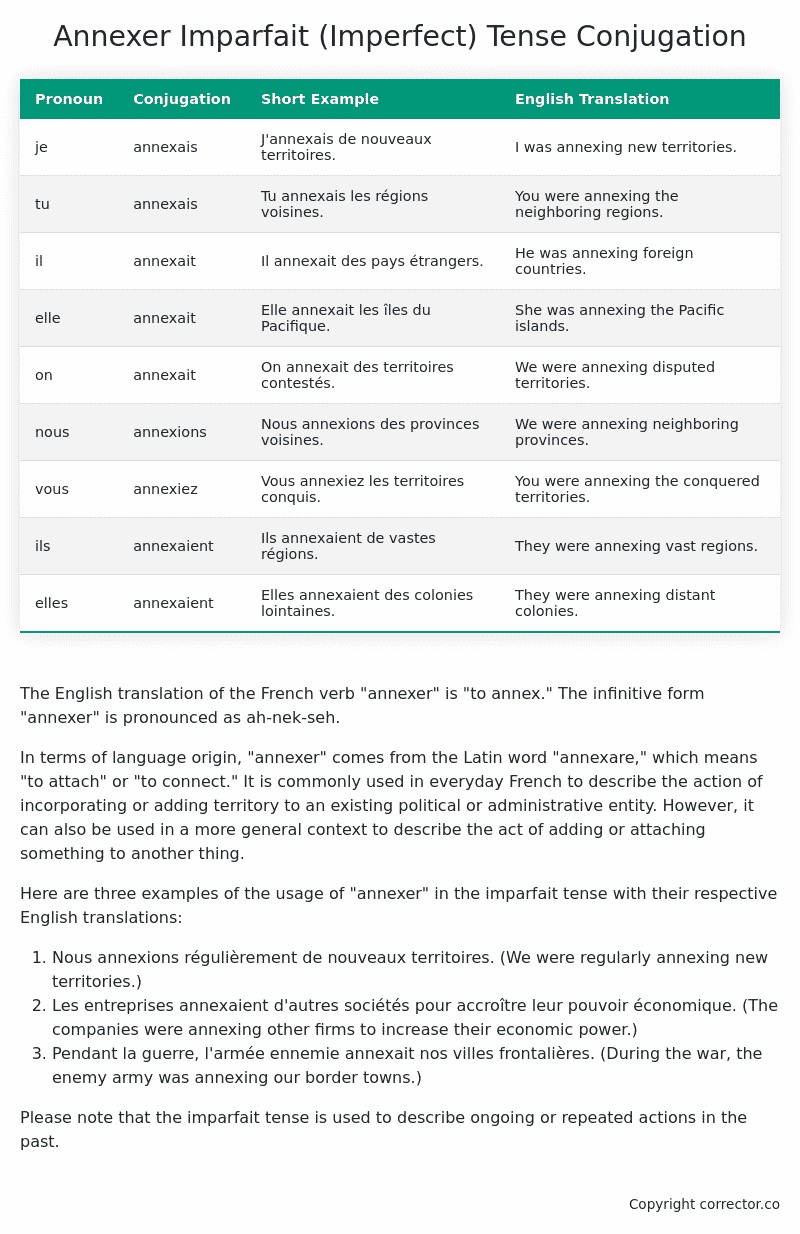Imparfait (Imperfect) Tense Conjugation of the French Verb annexer
Introduction to the verb annexer
The English translation of the French verb “annexer” is “to annex.” The infinitive form “annexer” is pronounced as ah-nek-seh.
In terms of language origin, “annexer” comes from the Latin word “annexare,” which means “to attach” or “to connect.” It is commonly used in everyday French to describe the action of incorporating or adding territory to an existing political or administrative entity. However, it can also be used in a more general context to describe the act of adding or attaching something to another thing.
Here are three examples of the usage of “annexer” in the imparfait tense with their respective English translations:
- Nous annexions régulièrement de nouveaux territoires.
(We were regularly annexing new territories.) - Les entreprises annexaient d’autres sociétés pour accroître leur pouvoir économique.
(The companies were annexing other firms to increase their economic power.) - Pendant la guerre, l’armée ennemie annexait nos villes frontalières.
(During the war, the enemy army was annexing our border towns.)
Please note that the imparfait tense is used to describe ongoing or repeated actions in the past.
Table of the Imparfait (Imperfect) Tense Conjugation of annexer
| Pronoun | Conjugation | Short Example | English Translation |
|---|---|---|---|
| je | annexais | J’annexais de nouveaux territoires. | I was annexing new territories. |
| tu | annexais | Tu annexais les régions voisines. | You were annexing the neighboring regions. |
| il | annexait | Il annexait des pays étrangers. | He was annexing foreign countries. |
| elle | annexait | Elle annexait les îles du Pacifique. | She was annexing the Pacific islands. |
| on | annexait | On annexait des territoires contestés. | We were annexing disputed territories. |
| nous | annexions | Nous annexions des provinces voisines. | We were annexing neighboring provinces. |
| vous | annexiez | Vous annexiez les territoires conquis. | You were annexing the conquered territories. |
| ils | annexaient | Ils annexaient de vastes régions. | They were annexing vast regions. |
| elles | annexaient | Elles annexaient des colonies lointaines. | They were annexing distant colonies. |
Other Conjugations for Annexer.
Le Present (Present Tense) Conjugation of the French Verb annexer
Imparfait (Imperfect) Tense Conjugation of the French Verb annexer (You’re reading it right now!)
Passé Simple (Simple Past) Tense Conjugation of the French Verb annexer
Passé Composé (Present Perfect) Tense Conjugation of the French Verb annexer
Futur Simple (Simple Future) Tense Conjugation of the French Verb annexer
Futur Proche (Near Future) Tense Conjugation of the French Verb annexer
Plus-que-parfait (Pluperfect) Tense Conjugation of the French Verb annexer
Passé Antérieur (Past Anterior) Tense Conjugation of the French Verb annexer
Futur Antérieur (Future Anterior) Tense Conjugation of the French Verb annexer
Subjonctif Présent (Subjunctive Present) Tense Conjugation of the French Verb annexer
Subjonctif Passé (Subjunctive Past) Tense Conjugation of the French Verb annexer
Subjonctif Imparfait (Subjunctive Imperfect) Tense Conjugation of the French Verb annexer
Subjonctif Plus-que-parfait (Subjunctive Pluperfect) Tense Conjugation of the French Verb annexer
Conditionnel Présent (Conditional Present) Tense Conjugation of the French Verb annexer
Conditionnel Passé (Conditional Past) Tense Conjugation of the French Verb annexer
Conditionnel Passé II (Conditional Past II) Tense Conjugation of the French Verb annexer
L’impératif Présent (Imperative Present) Tense Conjugation of the French Verb annexer
L’impératif Passé (Imperative Past) Tense Conjugation of the French Verb annexer
L’infinitif Présent (Infinitive Present) Tense Conjugation of the French Verb annexer
L’infinitif Passé (Infinitive Past) Tense Conjugation of the French Verb annexer
Le Participe Présent (Present Participle) Tense Conjugation of the French Verb annexer
Le Participe Passé (Past Participle) Tense Conjugation of the French Verb annexer
Struggling with French verbs or the language in general? Why not use our free French Grammar Checker – no registration required!
Get a FREE Download Study Sheet of this Conjugation 🔥
Simply right click the image below, click “save image” and get your free reference for the annexer imparfait tense conjugation!

Annexer – About the French Imparfait Tense
NOTE: To take a deep dive into all the French tenses then see our article on Mastering French Tense Conjugation.
Formation of the Imparfait Tense
For regular -er verbs:
For regular -ir verbs
For regular -re verbs
Common Everyday Usage Patterns
Description of Past Habits
Background Information
Mental and Emotional States
It’s employed to express emotions, thoughts, or physical sensations in the past. For example: “J’étais content quand il est arrivé.” (I was happy when he arrived.)
Ongoing Actions
Points to Note About the Imparfait Tense
Passé Composé vs. Imparfait
Conditional
Si Clauses
Narration
I hope you enjoyed this article on the verb annexer. Still in a learning mood? Check out another TOTALLY random French verb imparfait conjugation!


